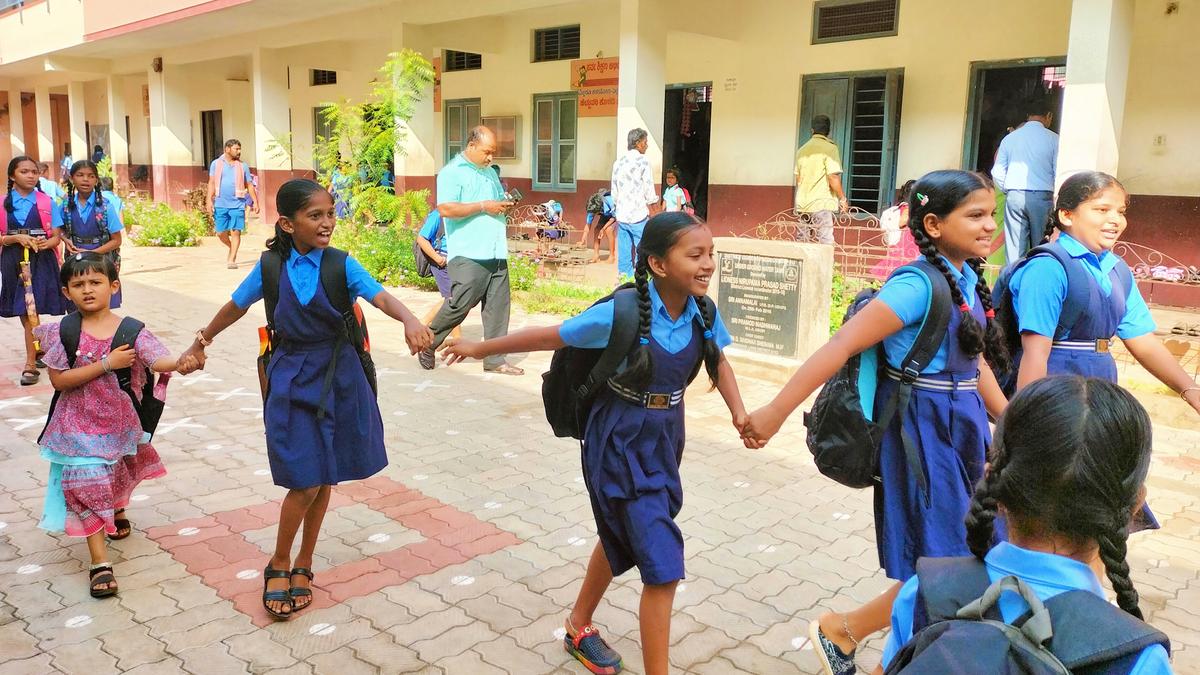
Students start the 2024-25 academic year with new uniforms, books
The Hindu
The distribution of new pairs of uniforms, textbooks and a traditional welcome of students marked the start of the new academic year 2024-25 in many schools across Dakshina Kannada and Udupi districts on Friday.
The distribution of new pairs of uniforms, textbooks and a traditional welcome of students marked the start of the new academic year 2024-25 in many schools across Dakshina Kannada and Udupi districts on Friday.
The students, including the newly-admitted children, were brought in a procession led by band. Parents too joined the procession. Teachers applied ‘tilak’ on the students and did ‘aarti’ before directing them to classrooms. The students of the government and aided schools were given a pair of uniforms and a set of textbooks and notebooks. Teachers joined the students and parents in eating traditional festival food prepared in the school’s kitchen.
At P.M. Shri Government Higher Primary School in Veeramangala in Puttur taluk, the students were involved in different activities, including text book identification, in the classroom. “This was done to make students aware about textbooks they have received,” said Headmaster Taranath Savanur. Most of the 185 children, including 35 who joined the school this year, took part in the opening day programme, he said.
At Government Higher Primary School, Moodambail in Bantwal taluk, headmaster and the three teachers involved all the 43 students of Classes 1 to 8 in different academic activities. The teachers had meetings with parents to share the academic plan and also answer their queries, including those related to school uniforms and textbooks.
With the State government yet to give clearance for the appointment of guest teachers as against vacant posts of teachers, the regular teachers have worked out ways to keep students engaged in academic activities till guest teachers take classes.

“Writing, in general, is a very solitary process,” says Yauvanika Chopra, Associate Director at The New India Foundation (NIF), which, earlier this year, announced the 12th edition of its NIF Book Fellowships for research and scholarship about Indian history after Independence. While authors, in general, are built for it, it can still get very lonely, says Chopra, pointing out that the fellowship’s community support is as valuable as the monetary benefits it offers. “There is a solid community of NIF fellows, trustees, language experts, jury members, all of whom are incredibly competent,” she says. “They really help make authors feel supported from manuscript to publication, so you never feel like you’re struggling through isolation.”

Several principals of government and private schools in Delhi on Tuesday said the Directorate of Education (DoE) circular from a day earlier, directing schools to conduct classes in ‘hybrid’ mode, had caused confusion regarding day-to-day operations as they did not know how many students would return to school from Wednesday and how would teachers instruct in two modes — online and in person — at once. The DoE circular on Monday had also stated that the option to “exercise online mode of education, wherever available, shall vest with the students and their guardians”. Several schoolteachers also expressed confusion regarding the DoE order. A government schoolteacher said he was unsure of how to cope with the resumption of physical classes, given that the order directing government offices to ensure that 50% of the employees work from home is still in place. On Monday, the Commission for Air Quality Management in the National Capital Region and Adjoining Areas (CAQM) had, on the orders of the Supreme Court, directed schools in Delhi-NCR to shift classes to the hybrid mode, following which the DoE had issued the circular. The court had urged the Centre’s pollution watchdog to consider restarting physical classes due to many students missing out on the mid-day meals and lacking the necessary means to attend classes online. The CAQM had, on November 20, asked schools in Delhi-NCR to shift to the online mode of teaching.









